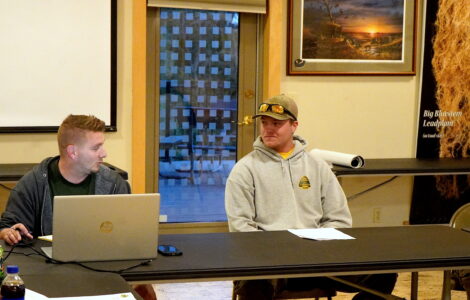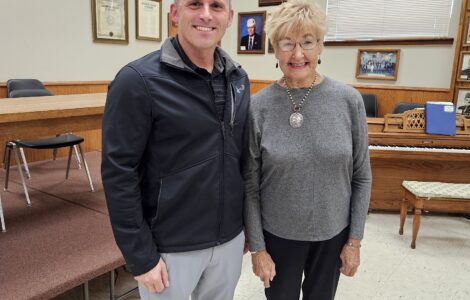‘Too much power for too few people for too long is bad’
Rob Sand brings campaign for governor to Grundy County on final stretch of 100 Town Hall Tour
- PHOTO BY RUBY F. MCALLISTER
- Rob Sand brings out the babies: All ages of folks were present on Monday, Oct. 20, 2025, during Sand’s Grundy County town hall stop at the Grundy Community Center in Grundy Center. PHOTO BY RUBY F. MCALLISTER
- State Auditor Rob Sand greets members of the public on Monday, Oct. 20, 2025, inside the Grundy Community Center Legion Room in Grundy Center ahead of his 100 Town Hall Tour stop in Grundy County. Sand, a Democrat, is running for governor in 2026. PHOTO BY RUBY F. MCALLISTER
- PHOTO BY RUBY F. MCALLISTER
- PHOTO BY RUBY F. MCALLISTER
- State Sen. Dave Sires (R-Cedar Falls) raises his hand when Rob Sand asks if there are any registered Republicans in the room on Monday, Oct. 20, 2025, in Grundy Center. PHOTO BY RUBY F. MCALLISTER
- PHOTO BY RUBY F. MCALLISTER
- PHOTO BY RUBY F. MCALLISTER
- PHOTO BY RUBY F. MCALLISTER
- PHOTO BY RUBY F. MCALLISTER
- PHOTO BY RUBY F. MCALLISTER
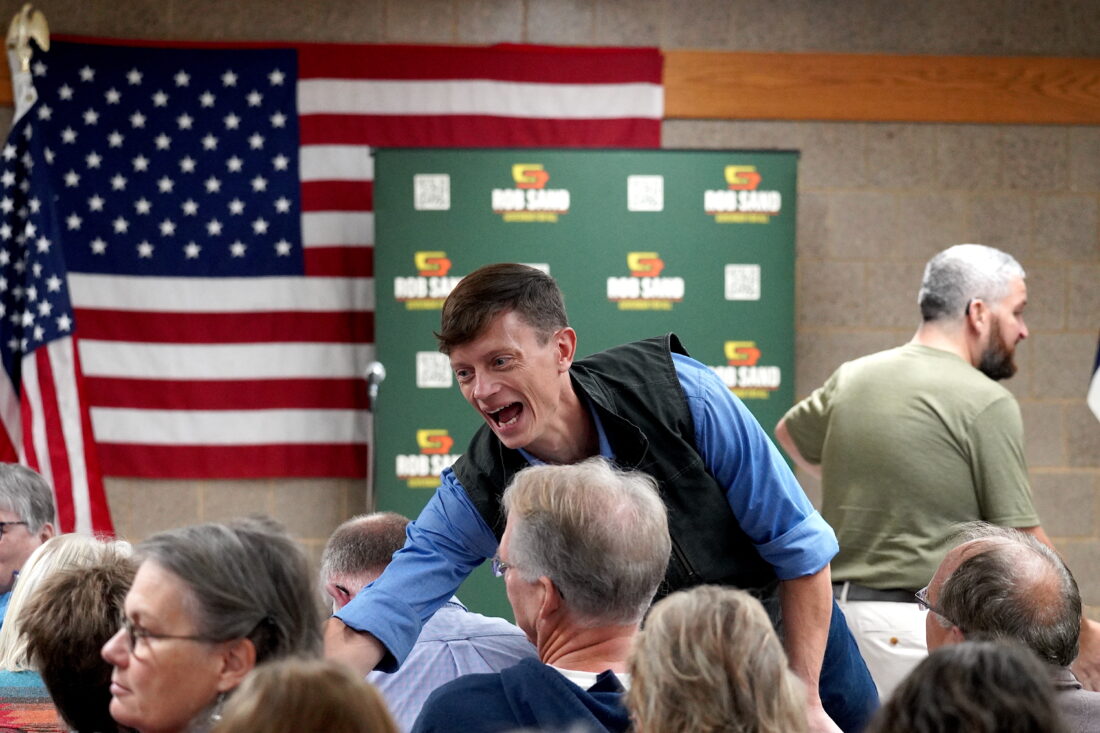
State Auditor Rob Sand greets members of the public on Monday, Oct. 20, 2025, inside the Grundy Community Center Legion Room in Grundy Center ahead of his 100 Town Hall Tour stop in Grundy County. Sand, a Democrat, is running for governor in 2026. PHOTO BY RUBY F. MCALLISTER
GRUNDY CENTER – State Auditor Rob Sand concluded his 100 Town Hall Tour this week after barnstorming the state – visiting every one of Iowa’s 99 counties, including both of Lee County’s seats – in less than 120 days as part of his pursuit to win next summer’s Democratic gubernatorial primary ahead of the November 2026 general election. Between Monday and Tuesday, he made 11 stops beginning with Grundy County on his penultimate day of the tour where a standing-room-only American Legion Room at the community building awaited him in Grundy Center.
As Sand, 43, entered the room just after 9 a.m. that morning, a round of applause and even a few enthusiastic shouts greeted him from the folks occupying nearly every one of the 72 chairs and those standing along the room’s cramped edges.
“Our political system is broken,” Sand declared as he began his now-burnished stump speech that somehow, four months on, still sounded like he was giving it for the first time to an impromptu grassroots gathering. “I am a believer in a very simple idea: Neither party is doing such a bang-up job of solving our problems to deserve a monopoly on our choices at the ballot box.”
As it stands currently, Grundy County, a rural county home to less than 13,000 people, is governed by one party and it’s not Sand’s. The entire county government, including all five supervisors, is Republican. During the 2024 general election, no Democrats ran for any of the county races. Iowa’s current governor, Republican Kim Reynolds, received nearly 75% of Grundy County’s vote share in 2022 – she is not running for reelection in 2026 – while the Democratic candidate, Deidre DeJear, received just under 23%.
Grundy County, at least on ballot paper, is very much a red county.
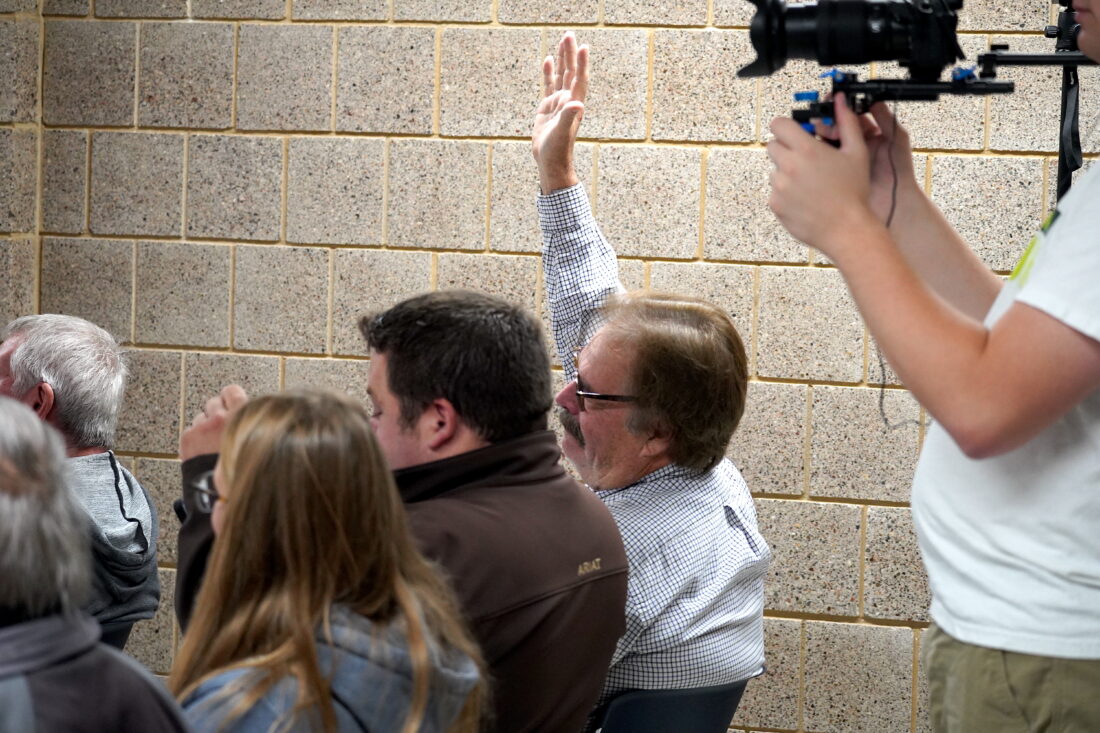
State Sen. Dave Sires (R-Cedar Falls) raises his hand when Rob Sand asks if there are any registered Republicans in the room on Monday, Oct. 20, 2025, in Grundy Center. PHOTO BY RUBY F. MCALLISTER
“Maybe we should do something about it,” Sand continued. “Instead of just pretending it’s not happening – and continue cheerlead for redder or cheerlead for bluer – maybe we should cheerlead for just better and truer. That’s the heart of this campaign.”
Following more applause, he went on to say that if Iowa is going to change its political system – putting the people “back in charge again” – the political culture must be changed first. He then asked for a show of hands from those registered as Republicans to which only a couple individuals raised their hands, including state Sen. Dave Sires, a Republican from Cedar Falls who knocked off incumbent Democrat Eric Giddens in last year’s election and was seated in the very back left corner of the room. Sand then asked Independents to raise their hands and a few more went up.
And then, as he does during every town hall, he asked the audience to join him in singing the first verse of “America the Beautiful” in an effort to prove “we can all band together and actually do things that are wonderful” despite political differences.
Stumping
On Monday morning, Sand was delivering his 90th stump speech as part of his 2025 tour. He hit all the proper notes, starting with a brief mention of his upbringing in Decorah (Winneshiek County) where he was born and raised and from where his paternal line hails. He was briefly interrupted by a woman near the front row at the mention of his hometown.
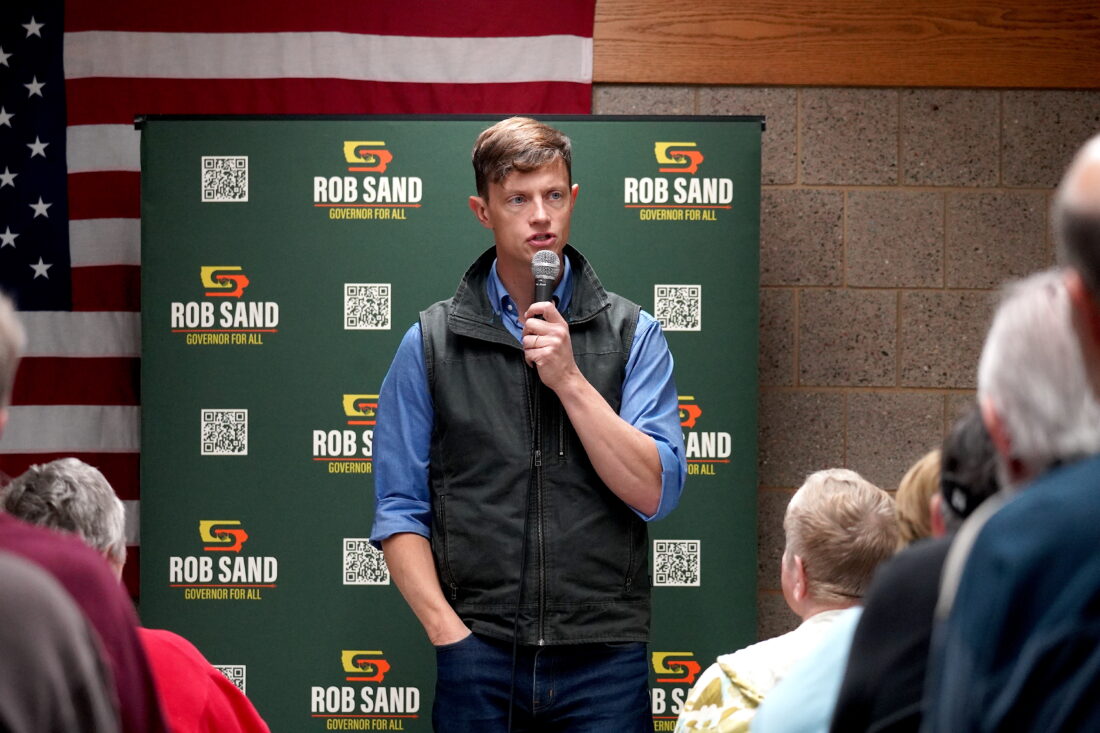
PHOTO BY RUBY F. MCALLISTER
“Are you a native?” Sand asked, stopping his speech.
“My grandparents were from there,” she excitedly replied.
“Oh, very good. Well, now I need to know the last name,” Sand said to which the woman replied with her family name. Much to the delight of the audience, Sand quipped back, “I got nothing. You always gotta check though, don’t ya?”
After describing his faith as being “particularly important” to him, he arrived at what has become the crux of his campaign for Iowa’s next governor – his non-partisan leanings.
“When I first registered to vote, I registered as an Independent voter,” he said. “I’m not particularly a fan of political parties. I think, right now in 2025, they do more to tear us apart than they do to help us.”
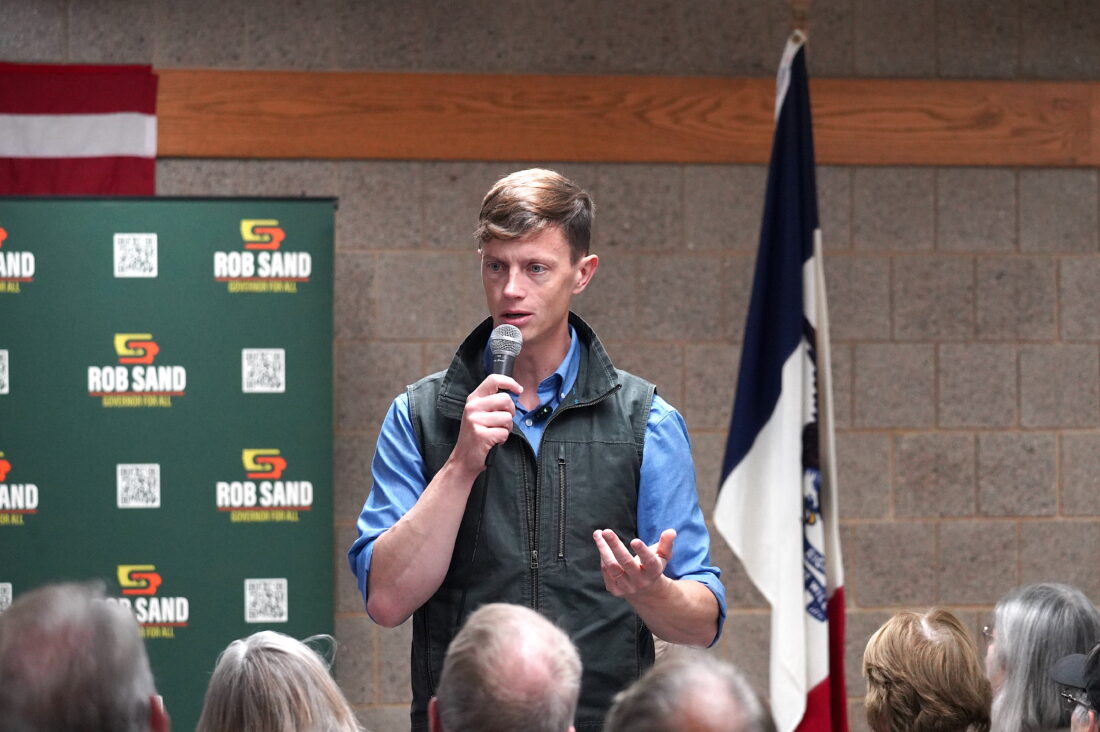
PHOTO BY RUBY F. MCALLISTER
He went on to talk about Iowa’s primary process that requires voters to first register with a party before being allowed to participate in a primary election – a system of voting Sand likened to “private clubs.” And while he acknowledged he eventually registered as a Democrat due to the party’s roots of being “for the little guy,” he also said he never left his “independent mind behind.”
Sand’s stump speech then wove through his professional career, including working in Iowa’s Office of the Attorney General where he “prosecuted most of the public corruption in Iowa from 2010 to 2017.” While working in the office, he said his worldview began to darken a bit, leading him to run for State Auditor.
“The [State Auditor’s] office has a tremendous capacity to promote government efficiency, and I knew they weren’t really doing it,” he said of the impetus behind his decision to run against Republican incumbent Mary Mosiman in 2018, whom he defeated. Four years later, he narrowly won reelection against Republican Todd Halbur, a realtor and small business owner. As State Auditor, Sand is the only Democrat holding statewide office today. But despite living and working in the Des Moines area, Sand does not think Iowa’s largest communities should have a monopoly on state government employment.
“We should make sure that the jobs in state government that can be done from small towns and rural areas, that those employees can live there if they want to,” he said. “Because it makes a much bigger difference for those small towns – just like Grundy Center – than it does for Des Moines or Ames or Iowa City to have that [employee and their family living there].”
Sand also discussed the “record amount of misspent money” his office has uncovered since his arrival.
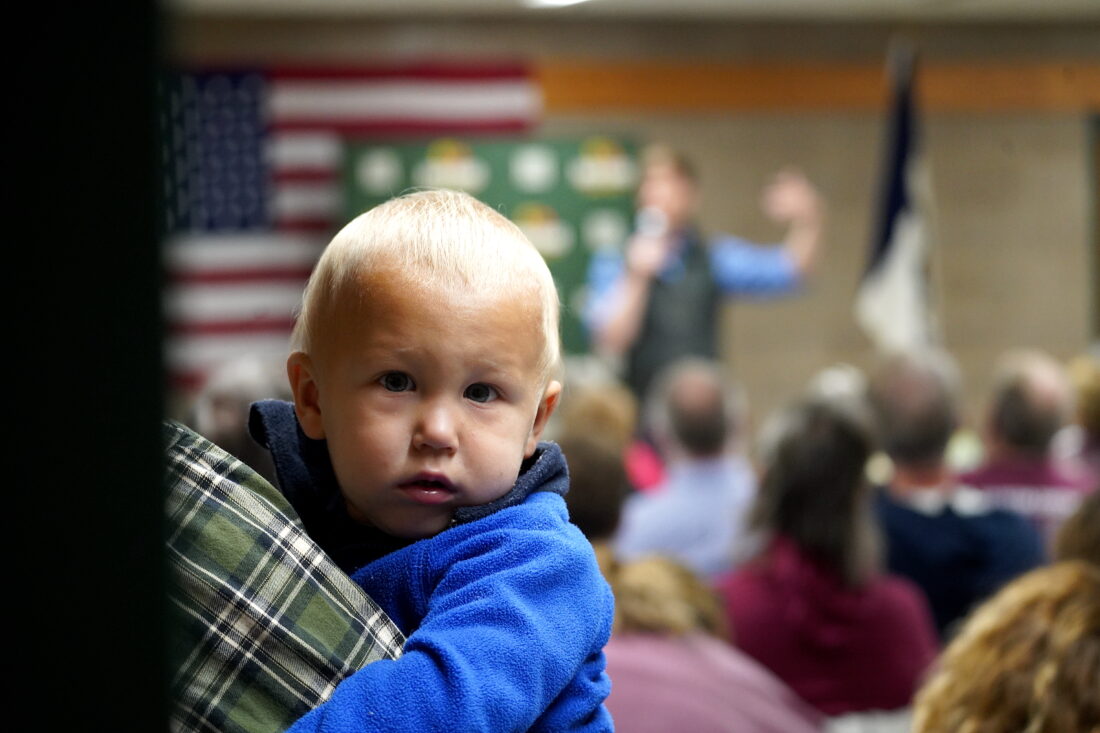
Rob Sand brings out the babies: All ages of folks were present on Monday, Oct. 20, 2025, during Sand's Grundy County town hall stop at the Grundy Community Center in Grundy Center. PHOTO BY RUBY F. MCALLISTER
“How did we do that? Different people who think differently working together,” he said in reference to his first two hires as State Auditor – a Republican and an Independent “who both had made campaign contributions to my opponent.” It was a decision, Sand said, that went against the grain of party politics and allowed his office to focus on “the job.” And the GOP’s response to Sand uncovering all that misspent money and subsequently capturing reelection in 2022?
“[T]he Iowa legislature passed a bill and the governor signed it into law – eight different categories of documents the Auditor’s Office is now no longer supposed to look at,” Sand explained, referencing Senate File 478 which passed in 2023 and limited his office from accessing certain private information. “I can tell you … that nonpartisan auditing agencies and organizations from around the country, every single one of them when they weighed in, said this is a bad law that will lead to an increase in waste, fraud, and abuse. … This is what we get, ladies and gentlemen, from 10 years of one-party control. … Too much power for too few people for too long is bad. … If it feels like your friends in other states are doing better, it’s because they are.”
Sand referenced both Iowa’s skyrocketing cancer growth rate and seeming disinvestment in public education as two of the reasons why folks in other states might be perceived as “doing better.”
Non-partisan, but not without passion
The words “pragmatic” and “non-partisan” have been used repeatedly, including by Tama-Grundy Publishing, to describe Sand this past year as he stumped from river to river around the state. But being non-partisan does not apparently mean Sand isn’t passionate about the issues. One issue in particular that repeatedly fires Sand up during his town halls is Iowa’s Students First Act which was signed into law by Gov. Reynolds in 2023 and established education savings accounts (ESAs) – colloquially known as private school vouchers.
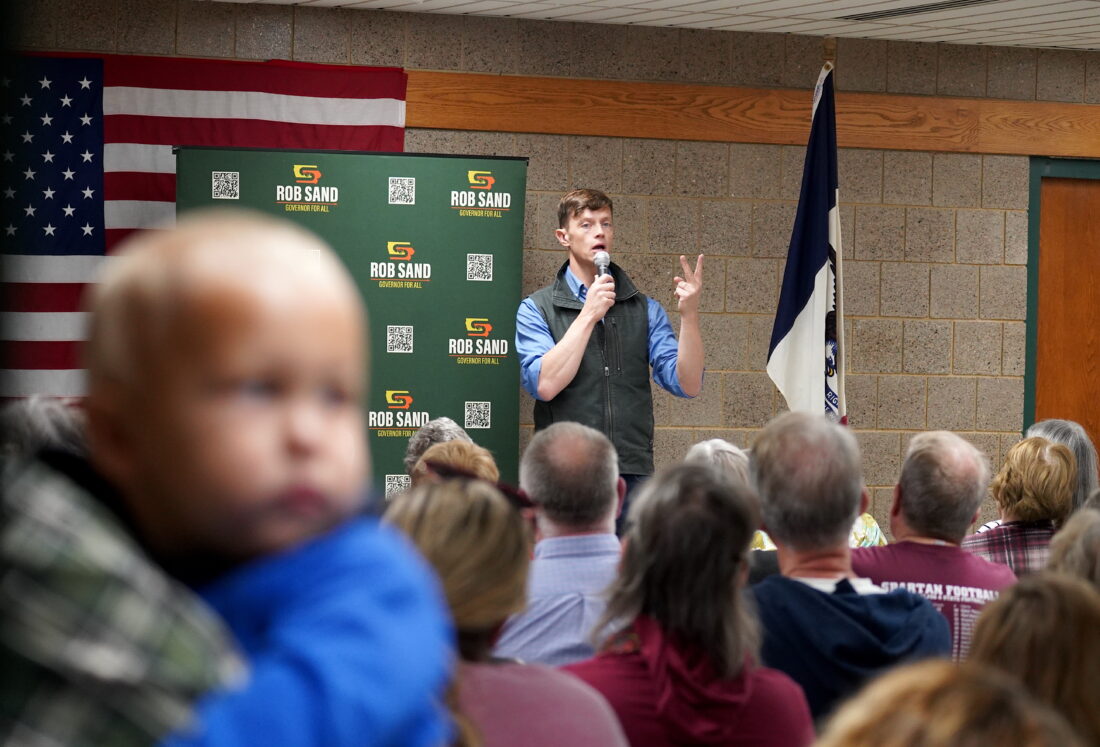
PHOTO BY RUBY F. MCALLISTER
During the Q&A portion of the Grundy County stop, Sand’s first query came from a young father who questioned the public money being spent on ESAs while the state’s actual public schools, particularly rural public schools, face increasing financial difficulty.
Sand began his response with the caveat that if elected governor, there would be no repeal of the law due to the Republican majority in the state legislature – a majority that passed the law and is therefore unlikely to change it. He then described a three-part solution.
“Here’s what I think we can do about the vouchers program. Number one, I want public oversight of public dollars,” he said, eliciting applause. “There is no financial oversight required, or even, from our perspective, allowed. … Now, I think that defies common sense, and I think the vast majority of Iowans, when we talk about that issue, will agree with me. We want public oversight for public dollars.”
He continued, “Number two, we should make a rule that if [a private school is] getting the $7,500 from the state [for an ESA], you can’t just hike tuition by $7,500 and tell everybody that it’s equally as unaffordable as before. That’s not fair, that’s not school choice.”
Sand also said ESAs should not be available to the wealthiest families in the state “who were going to send their kids to private school anyway.” The money saved by not allowing the highest earners access to the ESA program, he surmised, could then be reinvested into “all day, five-day-a-week preschool for every kid in the state of Iowa.”
“For every dollar that we invest into early childhood education, we save 17 [dollars] later because those kids are more likely to graduate from high school, more likely to keep a job, less likely to commit a crime, less likely to end up on public assistance. This is smart.”
Sand was later asked to comment on the age-old political playbook of talking big and delivering not much of anything once elected.
“Everybody who runs for office, they say they got plans. And then, you know what? Nothing changes,” he said, seemingly in agreement with the questioner. “You don’t really have to solve problems, you just have to demonize the only other option, right? … So here’s what I want to do. I want to tell the Democratic and the Republican parties, no more special privileges for you, I’ve had enough.”
Sand explained his idea, “The People’s Primary,” would replace Iowa’s current closed primary system. Such a primary, he said, would be open to all registered voters regardless of party and would include everyone on the same ballot, from Republicans to Democrats to Independents to Libertarians to even the Green Party.
“They all have to collect the same number of signatures. And then they’re all on the same ballot. And then all of us who are eligible voters, can go vote.” From there, the “top three to five” would be sent to the general election, he said.
“You’ll notice I didn’t say, ‘the top Democrat or the top Republican’ because, who cares? It’s about what the people in a district or state want, not about special privileges for some private club.”
In the subsequent general election, Sand explained he would like to follow the lead of Fargo, North Dakota.
“It’s called approval voting. Here are four candidates, vote for as many of them as you approve of. … whoever has the most people that support them, wins. Think for a moment about how this reorients the incentives for candidates in our system.”
By Sand’s thinking, such a system would not only lead to increased respect and kindness among candidates, but also to more problems actually being addressed following the election.
For the politically savvy, Sand’s off-the-cuff responses during his town hall Q&As this year – combined with his maverick persona – very much call to mind the politics of former U.S. Senator Russ Feingold of Wisconsin who served from 1993-2011 and was more than willing to buck his own party in pursuit of the greater good, particularly when it came to strengthening democracy.
Following the Q&A, Sand closed out his comments Monday morning by sharing several anecdotes of people he’s met recently who either never voted before or traditionally voted Republican, but were now planning to support Sand for Governor.
“There’s a guy that Republicans hired to follow me around for two years, to videotape my interviews. At the end of [the two years] he asked me for a bumper sticker,” Sand shared. “Now he says, ‘If it’s Sand versus at least some of the Republicans, I’ll vote for Sand’.”
That might be all it takes – ‘at least some Republicans’ – to move the needle in next year’s general election and flip the governor’s mansion away from “bluer or redder” to “truer and better,” as Sand so often says.
A lot could happen in a year but one thing appears certain after 120 days of Rob Sand barnstorming: A non-partisan approach to campaigning that simultaneously draws belly fire from pragmatic issues like government waste, public education, rural revitalization, and bringing common sense back to government sure seems to speak to a whole lot of Iowans these days.
Editor’s Note: This story is being published online ahead of the Friday, Oct. 31 edition of the Sun Courier.
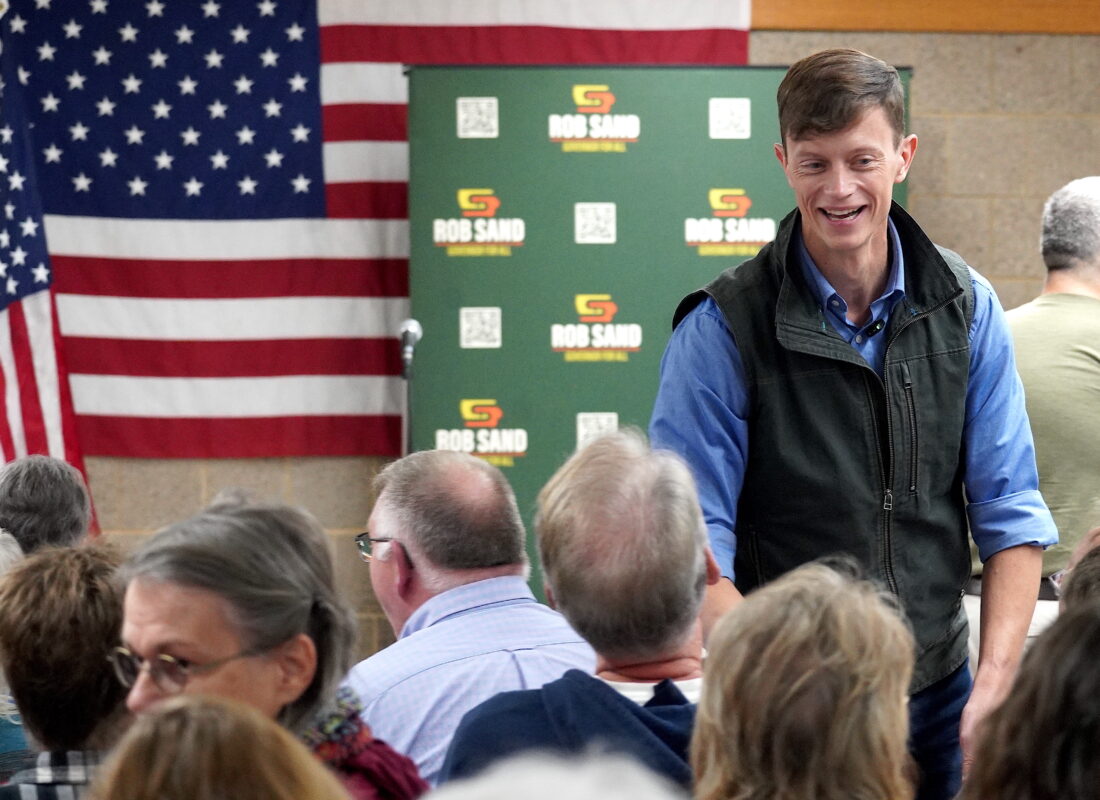
PHOTO BY RUBY F. MCALLISTER

